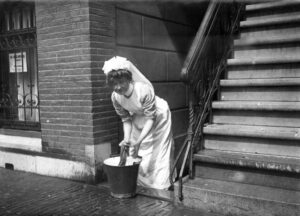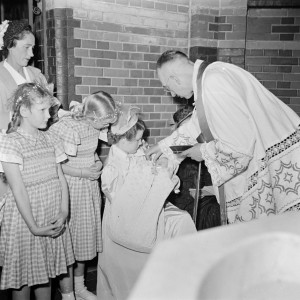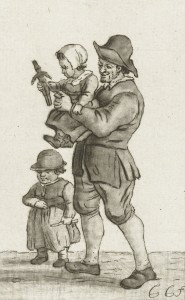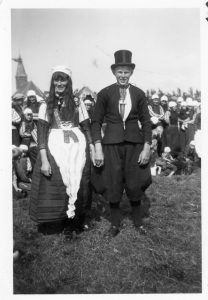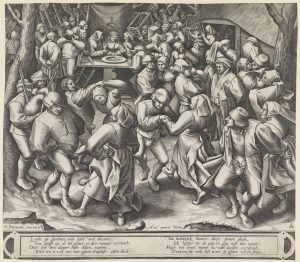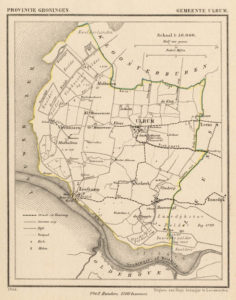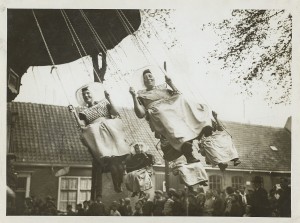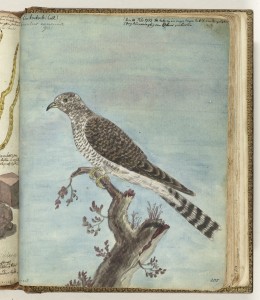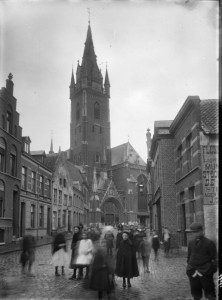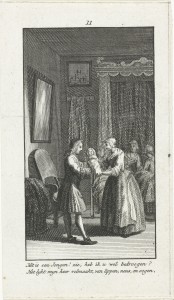A dienstmeid is a maid servant. The tasks of a dienstmeid depended on the wealth of the family, the presence of other servants or a housekeeper, and whether she worked on a farm or in the city. Tasks typically included cleaning, laundry, setting the fireplaces, etc. Richer households might hire a separate washing woman or cleaning lady, but in many households, this was all the task of one servant. On a farm, a dienstmeid would also be expected to milk the cows, take care of the other animals, … [Read more...]
Dutch term – Onecht kind
An onecht kind is a child born out of wedlock. You may encounter the term in baptismal records or court records. Here are tips for finding the father of an illegitimate child. … [Read more...]
Quick tip – The Legal Father May Not Have Been the Biological Father
If a child is born out of wedlock, it is possible he or she was later legitimized when the mother married. Legally, the mother's husband would then be the father. But that doesn't mean he was the biological father. In these situations, there are several things you can do to verify if the legal father was also the biological father: You can compare timelines of the mother and the legal father to see if they were in the same place around the time of conception. You can research the … [Read more...]
Dutch term – Moetje
A moetje is a situation where a couple married because the bride was pregnant; a shot-gun wedding in modern terms. "Moeten" is the verb "must" and "-je" is the diminutive form. So the marriage was a "bit of a must." Customs were different in different areas and among different social classes. Among laborers in Friesland, it was quite common to hold off marriage until the girl was pregnant. But among farmers in Gelderland, most children were born at least nine months after the wedding. By … [Read more...]
Source – Publication of the banns
In the Netherlands, you have to go in "ondertrouw" before you get married. This means that the banns are read, giving everyone in the community a chance to object to the marriage. In the period before the introduction of the civil registration, church records are the most important source of vital information. Many churches recorded the banns rather than the marriage. They recorded when the couple registered the banns, and sometimes noted the marriage announcements on three different times, … [Read more...]
Ask Yvette: Untangling two same-named women
My distant cousin, Fred Geurkink, asked me the following question [edited for brevity]: My grandma Gigi, (Marion Peterson), wrote down in her recollections about my great great grandma Grietje Koning. Said she was born on 30 Aug 1834, married my gg grandpa Jan Pieters Stelma on 23 Jun 1856, etc etc. On Ancestry, I received "hints" about said Grietje Koning from other members, who also married Jan Pieters Stelma, but her birthday was different: July 29 1834. Could my grandma be wrong, or are … [Read more...]
Dutch term – Kermis
The kermis is the carnival. Most towns have a carnival once of twice a year. The kermis was traditionally a time of courtship, where young folks got together. Some areas had a fair, where young women would line up and young men would select the girl of their choice to take to the carnival and to walk her home at the end of the night. Sometimes they had such a good time that a hasty marriage was scheduled soon afterwards ;-) If your ancestors had a baby within seven months of their … [Read more...]
Dutch term – Koekoeksgraad
I first heard the word Koekoeksgraad last week and liked it so much that I wanted to share it with you. Koekoeksgraad means "degree of cuckoos," the degree of non-paternity events per generation. I first heard the term in a presentation by forensic DNA expert Maarten Larmuseau, in a Youtube recording of his presentation about using Y-chromosomes to calculate the percentage of "cuckoos," children whose biological father doesn't match the documented line. Their research found that both … [Read more...]
The illegitimate, doubly baptized, incestuous orphan
Sometimes you read records and you wonder how much bad luck one person can handle. While doing research for a client I came across the following baptism in a transcription of the Roman-Catholic baptismal records for Venlo in 1750-1760:1 1751 13 november Anna Elisabetha conditionaliter rebaptizata est filia spuria Andreae Ketels et Gertrudis Podor qui sunt consanguinei in secundo consanguinitatis gradu: susce- perunt Jacobus Podor et Anna Elisabetha van Cauwenbergh As all Roman … [Read more...]
Dutch term – Vroedvrouw
A vroedvrouw was a midwife. There were also vroedmeesters, doctors specialized in helping women deliver children. The midwife was responsible for more than just seeing the mother and the child safely through the birth. In the case of an unwed mother, she was also urged to press the mother into revealing the name of the father of her child. It was believed that no woman would lie in childbirth. She would know that she could meet her maker at any minute and would have to account for her … [Read more...]
